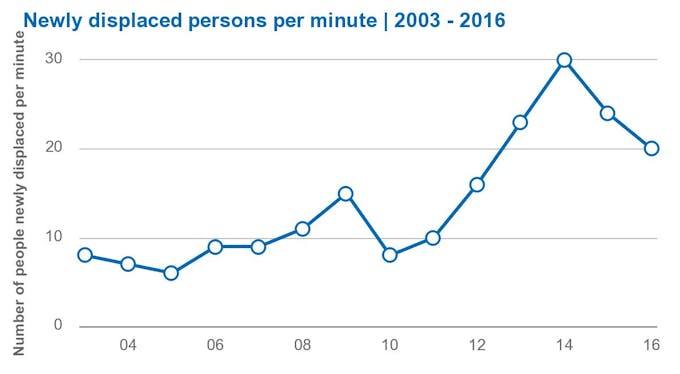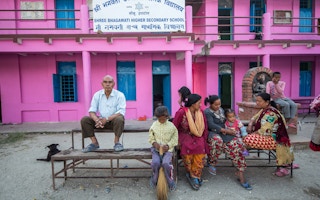A young refugee child on the streets of Hong Kong holds a poster in support of her parents’ right to work. She is one of the estimated 9,000 refugees caught in legal limbo in Hong Kong. Her parents, not permitted to work, are trying to survive on insufficient government handouts.
To continue reading, subscribe to Eco‑Business.
There's something for everyone. We offer a range of subscription plans.
- Access our stories and receive our Insights Weekly newsletter with the free EB Member plan.
- Unlock unlimited access to our content and archive with EB Circle.
- Publish your content with EB Premium.
The total cost of assistance to asylum seekers in Hong Kong for the 2013-14 fiscal year was HK$450 million. This cost was expected to rise sharply and in 2016, then former Chief Executive of Hong Kong, Leung Chun-ying, referred to the expected expenditure related to the backlog of asylum claims as “extremely troubling for Hong Kong,” admitting “it exerted a lot of pressure on the administration.”
In the midst of the highest levels of displacement on record, it’s time to reconsider the relationship between the private sector and refugee populations, and how responsible businesses in Asia can leverage opportunities related to refugees that create shared value for all stakeholders.

Source: UNHCR Global Trends 2016
The Asia and Pacific region hosts 11 per cent of the world’s displaced people including 3.5 million refugees.
However, despite the Asian Development Bank reporting that Asia will continue to provide about 60 per cent of global growth over 2017-18, the Brookings Institute reported last year that “Asia lacks good regional models of constructive refugee policy and capacity-building to host the strangers at the gates,” and that “for Asian countries to continue their economic growth and political rise, they’ll need better national and regional efforts to open up to the world’s diverse people and cultures.”
Nearly two-thirds of all refugees have been or will be displaced for at least three years, otherwise known as ‘protracted displacement.’ With almost half of all refugees having been displaced for over ten years, it appears that this is no longer just a humanitarian crisis, and there is a dire need for innovative solutions to this multifaceted problem.
Moreover, when more than 60 per cent of refugees are living in urban settings, not camps, refugee populations across the Asia Pacific region present what the Commissioner of the United Nations High Commissioner for Refugees Filippo Grandi described as “a rich source of human capital that we are failing to cultivate.”

Across the globe tensions are high from concerns that influxes of displaced persons will result in increased crime levels and related social problems.
For businesses facing labour shortages, on boarding refugee employees – who are often more motivated and highly-adaptable than local employees - can ease tension and promote stability, while also enabling positive interactions where locals see refugees as adding value to the communities in which they are hosted.
This approach can also relieve spiralling refugee related costs, like those in Hong Kong, and provide increased tax revenue for local governments, amongst other benefits.
Examples of this are seen throughout Africa. Where unlike in most Asian countries, refugees face substantial restrictions on their right to work and to move freely, they still actively contribute to the local economy. Asylum Access has recently reported on the right to work in 15 countries, finding “that working refugees bestow a range of benefits upon their host countries. Refugee entrepreneurs stimulate economies, creating businesses and jobs.
“
Forward-thinking businesses are uniquely positioned to help with the refugee crisis through innovative solutions that can empower and integrate refugees while reducing turnover rates, increasing workplace diversity, and instilling trust among stakeholders.
They bring new skills into the country and place new demands for goods and services, diversifying markets and expanding trade. They pay taxes and prevent wage-depression.”
As outlined by the World Economic Forum, there are three important ways the private sector can address the refugee crisis:
- Leverage market agility to respond quickly - ‘the business community can generally prove faster and more flexible than governments due to its lack of constraints or bureaucracy that can impede government, and companies’ ability to respond quickly to market opportunities – or humanitarian crises.’
- Fill humanitarian response gaps - ‘the business community can fill a gap in response to the crisis. Beyond the need for immediate humanitarian relief, the refugee crisis also has an economic component: in many cases, it represents a business opportunity, as new arrivals offer their talents and knowledge to forward-thinking firms. As a result, it is not just corporate social responsibility departments that are driving companies’ response.’
- Welcome the skillset diversity and perspectives that refugees bring - ‘the business community’s reaction can highlight the long-term advantages of migration, something that politicians in fear of (or in thrall to) xenophobic currents have struggled to accomplish. The private sector’s enthusiastic involvement helps make the case for the bright side of the refugee influx: it can help close demographic deficits, plug gaps in its labour market, and supply a cohort of young workers and taxpayers for the future.’
Forward-thinking businesses are uniquely positioned to help with the refugee crisis through innovative solutions that can empower and integrate refugees while reducing turnover rates, increasing workplace diversity, and instilling trust among stakeholders. In addition to actively engaging with local government and community groups, there are other actionable reforms that businesses can consider, including:
- Offering private sponsorship to refugees (as promoted by Canada)
- Empowering refugees through ICT by providing mobile phones and internet platforms, enabling them to better protect themselves and identify livelihoods, education and productivity opportunities
- Engaging in refugee matching and job matching services that match refugees with local businesses using high-tech jobs platforms
- Supporting risk sharing investments that aim to address problems created in countries of first asylum by providing entrepreneurship and employment for both refugees and locals5
In the wake of the 16th World Refugee Day, the need has never been greater for multi-stakeholder driven programmes that can create shared value for all – from the refugees and companies concerned, to the host communities, local economy and wider society. Businesses that are willing to engage with this issue now may well reap the largest rewards tomorrow.
As Nicholas Logothentis, Co-founder & Chairman of the Board at Concordia, the co-organiser of Forced Migration Forum posits, “The characteristics of an outstanding employee include hard work, perseverance, the resolve to overcome challenges, problem-solving skills, self-sufficiency and motivation. Employers also typically want to diversify their workforce and attract teams with diverse skill-sets. Refugees fill all these needs and more.”
Aaron Sloan is based in CSR Asia’s Hong Kong office. This article is republished from CSR Asia Weekly.











